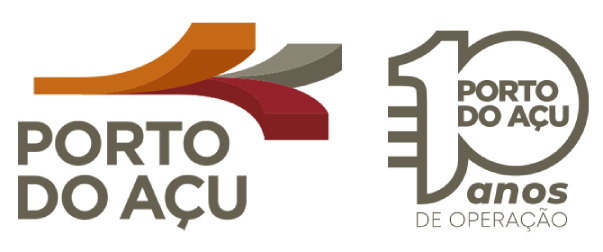Prumo reported positive EBITDA (earnings before interest, taxes, depreciation and amortization) of R$43 million for the second quarter of this year. The figure appears in the earnings report for the second quarter of 2015, released today by the company, and shows that this was the third quarter of positive results for the company.
“We are celebrating a new era for the company. A year ago we received at the port our first load of iron ore. Since then, 60 ships have already docked at Açu Port. We began operations within the projected budget and meeting the forecasted schedule, and the main risks that were identified during the change in control were mitigated in less than two years. A third quarter in a row with positive EBITDA is the result of these actions,” says Eduardo Parente, CEO of Prumo.
Since 2007, when port construction began, some R$8.5 billion have been invested in Açu Port. Of this amount, R$3.2 billion were invested by Ferroport (a joint venture between Prumo and Anglo American) and by Anglo American, and R$5.3 billion by Porto do Açu Operações (a subsidiary of Prumo Logística). The total value doesn’t include capitalized interest.
Highlights
The second quarter of 2015 was marked by important announcements, such as the signing of contracts, expansion of business areas, and the renegotiation of debt. “We had a lot of new developments in the last months which enhance Açu Port. Edison Chouest early exercised its options, signing a contract with Petrobras and announcing that its offshore services supply base, which will be the largest in the world, will begin operations in November. BG brought its oil transshipment operations to Açu, and Oiltanking valued the terminal as US$1 billion. We aligned our debt profile to our cash flow by extending it to 18 years, with a four-year grace period. We signed a contract and started bauxite operations with the Votorantim group. It’s the recognition, by many world-class companies, of Açu Port’s competitive advantages,” Parente noted.
Prumo signed a contract with BG to carry out the transshipment of an average volume of 200 kbpd at Açu Port. The contract is for 20 years and establishes that, within 18 months of the contract’s signing, BG will have the option to increase the quantity of its take-or-pay contract to 320 kbpd. Operations are scheduled to begin August 2016.
In addition, Edison Chouest exercised the option to expand its area, and now has a total area of 597,400 square meters, with a quay of 1,030 meters. With 15 berths where ships can moor and a shipyard for repairs, the location will be the largest offshore services supply base in the world and be able to handle traffic of more than 6,000 ships per year.
Prumo also signed a contract with the Rio de Janeiro real-estate developer InterRio to build a hotel at the Açu Port Industrial Complex. The project, with an expected investment of R$30 million, will have a total area of 10,649 square meters and 200 rooms. The hotel is the first convenience center that is being developed at the port, which will also include commercial offices and convenience services.
In July, Prumo signed a contract with Votorantim Metals to load bauxite and pet coke at the Multicargo Terminal (TMULT) at Açu Port. Under the contract, which forecasts the handling of 300,000 tonnes per year, operations are set to start in August of this year, kicking off operations at the terminal.
In addition, the company signed a contract with Oiltanking to sell a 20% stake in the Açu Port Oil Terminal for US$200 million. The company also will be responsible for operating the Terminal, which is licensed to handle up to 1.2 mbpd and has the capacity to receive VLCC ships.
Prumo received final approval from the BNDES for a long-term loan of R$2.8 billion, of which R$2.3 billion will be used to amortize bridge loans granted previously by the Bank and through guarantees from Bradesco and Santander banks. The loan has a maturity of 18 years, with a four-year grace period and a 14-year amortization schedule.
The company also signed a commercial management contract for the area occupied by OSX at the Açu Port Industrialr Complex, giving it exclusive rights to prospect new investors willing to install facilities directed at or related to the shipping industry.
Earnings
Between April and June of this year, R$300 million were invested at Açu Port (not including capitalized interest), with R$139.5 million carried out by Ferroport and Anglo American, and R$160.5 million by Porto do Açu Operações. Of this amount, R$51.0 million were directed to the construction of the breakwater and R$66.6 million to dredging, both at Terminal 1. In the Terminal 2 channel, R$80.3 million was paid out, which includes R$29.7 million for the breakwater, R$4.8 million for dredging the channel, and R$45.8 million for the TMULT and others.
In the second quarter of 2015, net consolidated revenue reached R$88.2 million, compared with R$19.5 million for the year-earlier period. The difference comes mainly from the new contracts signed during 2014 and at the beginning of 2015, and from the start of Ferroport operations in October 2014. The net revenue from the take-or-pay contract alone reached a total of R$63 million during the quarter (50% of the revenue reported at Ferroport).
The company ended the quarter with net cash and equivalents of R$150 million, and with debt of R$3.3 billion, including interest and current exchange rates. With the refinancing of its debt with Bradesco, Santander, and BNDES banks, short-term debt was completely extended to long-term debt. As a result, the company’s earnings in the next quarter should already reflect this operation.
The consolidated net financial result for the period was negative, at R$67.5 million. Financial expenses totaled R$92 million, composed mainly of interest, brokerage fees, and exchange-rate fluctuations. Financial revenue was R$24.5 million, coming mainly from interest on mutual funds, earnings from financial investments, and interest. Net losses were R$23.5 million.
About Prumo
Prumo Logística develops and operates Açu Port. The company offers infrastructure solutions for the oil and gas industry, as well as areas for companies in the maritime and industrial sectors to install facilities at Açu Port. Prumo has been controlled by EIG Global Energy Partners since 2013.
Located in São João da Barra, Rio de Janeiro state, Açu Port began operations in 2014 and serves the sector’s leading companies with excellence in safety. Açu Port includes a total area of 90 km2, spread across two terminals: Terminal 1 (T1 – offshore terminal) and Terminal 2 (T2 – onshore terminal).
T1 is dedicated to loading iron ore and petroleum, with berths built along a 3 km quay and which can receive ships with draughts of up to 24 meters. Operational since October 2014, the terminal has already received more than 30 iron ore ships for Anglo American. The companies have a 50-50 joint venture (called Ferroport).
TOIL, which will begin operations in August 2016, will be operated by Oiltanking and will have the capacity to move 1.2 mbpd, receiving Suezmax and VLCC ships. Recently, the company signed a 20-year contract with BG for the transshipment of oil, with average volume of 200 kbpd. T1 also includes an oil-storage project and other onshore oil services.
T2 is a terminal built around a shipping canal that is 6.5 km long, 300 meters wide and up to 14.5 meters deep. Technip, NOV, and Wartsila are already operating at T2. The Multicargo Terminal (TMULT) began operations in July with the shipment of bauxite for Votorantim. Edison Chouest Offshore (ECO), which is building the world’s biggest offshore supply base at the port, with 15 berths, already signed a contract with Petrobras to operate 6 berths at its terminal. In addition, BP and Prumo created a 50-50 joint venture to sell marine fuel to ships using the port.
Prumo also created the RPPN Fazenda Caruara Private Nature Reserve, the first private reserve of restinga scrub forest in the country, with an area of 40 km2. Açu Port currently employs close to 10,000 people, with 3,500 of those in the operational area. When in full operation, the estimate is that Açu Port will generate close to 40,000 jobs.

